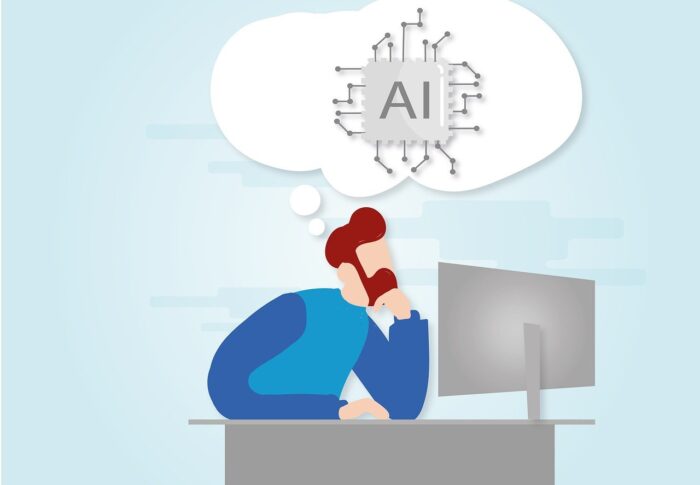
Finding Your Dream Job: How AI is Making the Hunt Easier.
Finding a suitable job nowadays can be very challenging. There are usually hundreds (if not thousands) of job postings to sift through. It can be overwhelming and time-consuming for job seekers to find a job that fits their unique skills and talent. However, with the integration of artificial intelligence (AI), the job search process can be streamlined and made more efficient. In this article, we will explore how AI can be used to boost job search and increase the chances of job seekers finding their dream job.
1. Job Matching: AI-powered job matching platforms are designed to match job seekers with relevant job postings. These platforms use algorithms that analyze job seekers’ profiles and compare them with job requirements to find the best match. Some well known platforms that use AI for job matching are:
- ZipRecruiter, an online job board that uses AI to match job seekers with open positions based on their skills and experience.
- Monster which uses AI-powered job matching technology to match job seekers with job openings based on their experience, education, and skills.
- LinkedIn has a job matching feature that uses AI to analyze a job seeker’s profile and recommend job postings that match their skills and experience.
- Glassdoor has a job matching feature that uses AI to match job seekers with job postings based on their location, experience, and job preferences.
- Indeed also has an AI-powered job matching feature that suggests job postings to job seekers based on their search history and profile information.
These platforms are very easy to use and usually require that potential users create a profile, enter their skills, experience, education, and job preferences. Once a profile is created, job seekers can use the search function to find and apply for job postings that match their qualifications and preferences.
By using these platforms, job seekers can save time and increase their chances of finding a suitable job.
2. Resume Scanning: Resume scanning is a useful tool that can help job seekers get their foot in the door for potential job opportunities. Resume scanning is a process of using software to analyze and sort through resumes, identify relevant keywords, and rank candidates based on their qualifications. The software uses natural language processing (NLP) and machine learning algorithms to understand the text and context of the resume and match it to the job description. Job matching platforms use AI for resume scanning to boost job search.
Resume scanning helps to speed up the hiring process by automating the initial screening of resumes, which can save recruiters a lot of time and effort. It also helps to eliminate human bias in the initial screening process and ensure a fair and unbiased evaluation of all applicants. However, job seekers need to be aware of the importance of including relevant keywords in their resume to increase their chances of getting noticed by resume scanning software. They should also avoid using fancy fonts, graphics, or unusual formatting, as these can confuse the software and lead to their resume being rejected. Job seekers can also use resume optimization tools to optimize their resume for resume scanning software. These tools analyze the resume and suggest changes to improve its chances of getting noticed by resume scanning software. It is important to note that while AI can assist with job search, it cannot replace the importance of networking and making personal connections in the job search process.
3. Virtual Assistants: These are innovative application of AI that can also boost job search. They can perform a wide range of tasks, such as scheduling interviews, sending out job applications, and answering basic questions about the application process. Virtual assistants can also provide personalized career advice and recommend job opportunities based on a job seeker’s preferences, skills, and experience. Virtual assistants are especially useful for job seekers who are applying to multiple positions and need help keeping track of all the applications and interviews. They can also save time and streamline the job search process by handling repetitive tasks, such as filling out online job applications and sending out follow-up emails.
4. Interview Preparation: Interview preparation is a critical aspect of the job search process, and AI can play a valuable role in helping job seekers prepare for interviews. AI-powered interview preparation tools can provide valuable resources and support to enhance interview performance. Some ways AI can assist with interview preparation include:
- Mock Interviews: AI-powered platforms can simulate interview scenarios and conduct mock interviews. These tools use machine learning algorithms to analyze common interview questions and provide realistic interview responses. Job seekers can practice their responses, receive feedback, which can help improve their interviewing skills.
- Interview Question Analysis: AI can analyze job postings and interview data to identify commonly asked interview questions for specific roles or industries. By understanding the most frequently asked questions, job seekers can better prepare their responses and showcase their relevant skills and experiences.
- Behavioral Analysis: AI can analyze a job seeker’s verbal and non-verbal responses during mock interviews. It can provide feedback on body language, tone of voice, and speech patterns. This analysis helps job seekers identify areas for improvement and refine their communication skills.
- Interview Tips and Guidance: AI-powered interview preparation tools can offer personalized tips and guidance based on a job seeker’s background and the specific role they are interviewing for. These tools can provide insights on what employers look for, how to highlight strengths, and how to address potential weaknesses.
- Feedback and Performance Evaluation: AI can analyze interview performance and provide detailed feedback to job seekers. It can assess the quality of answers, provide suggestions for improvement, and identify areas where job seekers can enhance their responses.
- Cultural Fit Assessment: Some AI-powered tools can assess cultural fit by analyzing a job seeker’s values, behavior patterns, and personality traits. This information can help job seekers better understand the company’s culture and align their interview responses accordingly.
By leveraging AI-powered interview preparation tools, job seekers can gain a competitive edge and improve their chances of success in job interviews. These tools provide valuable insights, practice opportunities, and personalized feedback, which helps job seekers refine their interview skills and present themselves confidently to potential employers.
5. Networking: Networking is a crucial aspect of job searching, and AI can help job seekers to connect with professionals in their desired industries. AI-powered networking platforms can help job seekers to identify and connect with relevant professionals, learn about job opportunities, and receive referrals from their networks. An example of an AI-powered platform that connects professionals worldwide, allowing users to build their networks, learn about job opportunities, and connect with recruiters is LinkedIn. The platform’s AI algorithms analyze users’ profiles, activities, and job preferences to suggest job opportunities and connect them with relevant professionals.
Job seekers can also leverage AI-powered chatbots to network and seek advice from professionals. For instance, Honeypot is an AI-powered chatbot that connects job seekers with mentors and industry experts. The platform enables users to chat with professionals, learn about career opportunities, and receive feedback on their resumes.
By leveraging these tools, job seekers can expand their networks, learn about potential job opportunities, and receive career advice from relevant professionals.
6. Skill Development: Skill development is an essential aspect of job search, and AI can be a valuable tool in this regard. AI-based skill development platforms can analyze a job seeker’s skills and identify areas that need improvement. These platforms can then provide customized training and development programs to help the job seeker acquire the necessary skills. An example of an AI-based skill development platform is Coursera. Coursera uses machine learning algorithms to personalize the learning experience for each user. The platform analyzes a user’s skills, experience, and career goals to recommend relevant courses and skills that will help them achieve their objectives. In addition, Coursera offers a wide range of courses from top universities and organizations, making it an excellent resource for job seekers looking to enhance their skill sets.
Another example of an AI-based skill development platform is LinkedIn Learning. LinkedIn Learning provides access to thousands of courses and tutorials on a wide range of topics, including business, technology, and creative skills. The platform uses AI to recommend courses based on a user’s profile and search history. LinkedIn Learning provides a certificate of completion that job seekers can add to their resumes and LinkedIn profiles to demonstrate their newly acquired skills.
7. Salary Prediction: Salary prediction is crucial in the job search process and job seekers can benefit from the help of AI. It involves using data analytics and machine learning algorithms to analyze various factors that influence the salary of a particular job, such as location, industry, experience, education, and skills. AI-powered platforms can analyze these factors and provide an estimate of the salary range for a specific job position. This information can help job seekers make informed decisions about salary negotiations and the job search process in general. For instance, Glassdoor is a platform that provides salary predictions for job positions based on industry, location, company size, and other factors. The platform leverages machine learning algorithms and data analysis to provide users with an accurate salary estimate based on the job title and location. Similarly, LinkedIn Salary tool uses data from millions of profiles to provide personalized salary predictions for specific job titles and locations.
In addition to providing salary predictions, AI-powered platforms can also help job seekers identify the skills that are in demand for a particular job position. For example, LinkedIn Learning uses machine learning algorithms to analyze job postings and identify the skills that are most in demand for a specific job position. This information can help job seekers prioritize their skill development and enhance their chances of getting hired. Furthermore, AI-powered platforms can also help job seekers identify career paths and job positions that align with their skills and interests. For instance, IBM Watson Career Coach is an AI-powered platform that uses natural language processing and machine learning to analyze the skills and experience of a job seeker and provide personalized career recommendations.
8. Job Market Insights: Job market insights are a valuable resource for job seekers, and AI can provide powerful tools to gather and analyze this data. These insights provide job seekers with valuable information about industry trends, job demand, and skill requirements, helping them make informed decisions about their career paths and job search strategies. AI-powered job market platforms, such as Burning Glass, gather and analyze vast amounts of job market data from various sources, including job postings, career sites, and social media. These platforms use machine learning algorithms to identify patterns and trends in the data, providing real-time insights into the job market. One of the key benefits of job market insights is the ability to identify high-demand industries and occupations. AI algorithms can analyze job postings and identify sectors that are experiencing growth and have a higher number of job opportunities. This information can guide job seekers in focusing their efforts on industries that are likely to offer more employment prospects.
Another aspect of job market insights is the analysis of skill requirements. AI can analyze job postings and identify the specific skills and qualifications that employers are seeking for different roles. This information helps job seekers understand the skills that are in high demand and can guide their skill development efforts. By aligning their skill sets with the requirements of the job market, job seekers can enhance their competitiveness and increase their chances of securing desirable job positions. Furthermore, job market insights can provide information on salary trends, geographic job distribution, and emerging job roles. This information helps job seekers gain a comprehensive understanding of the job market landscape and make informed decisions about their career paths.
By leveraging AI-powered job market insights, job seekers can stay updated on industry trends, align their skills with market demands, and make strategic decisions to optimize their job search. These insights act as a compass, guiding job seekers towards promising opportunities and helping them navigate the dynamic and competitive job market landscape.
AI has the potential to revolutionize the job search process by making it more efficient and personalized. By using AI-powered job search tools, job seekers can save time, increase their chances of finding a suitable job, and make informed decisions about their career paths. As AI technology continues to evolve, it will be interesting to see how it will shape the future of the job market.
Disclaimer: The names of AI-powered job platforms mentioned in this article are provided for informational purposes only. The inclusion of these platforms does not imply any endorsement or recommendation. The article is not sponsored or compensated by any of the mentioned platforms. The platforms mentioned are based on general knowledge and research, and readers are encouraged to conduct their own independent research and evaluation before using any job search platform or service. The author and the website do not assume any responsibility for the accuracy, reliability, or effectiveness of the mentioned platforms.




